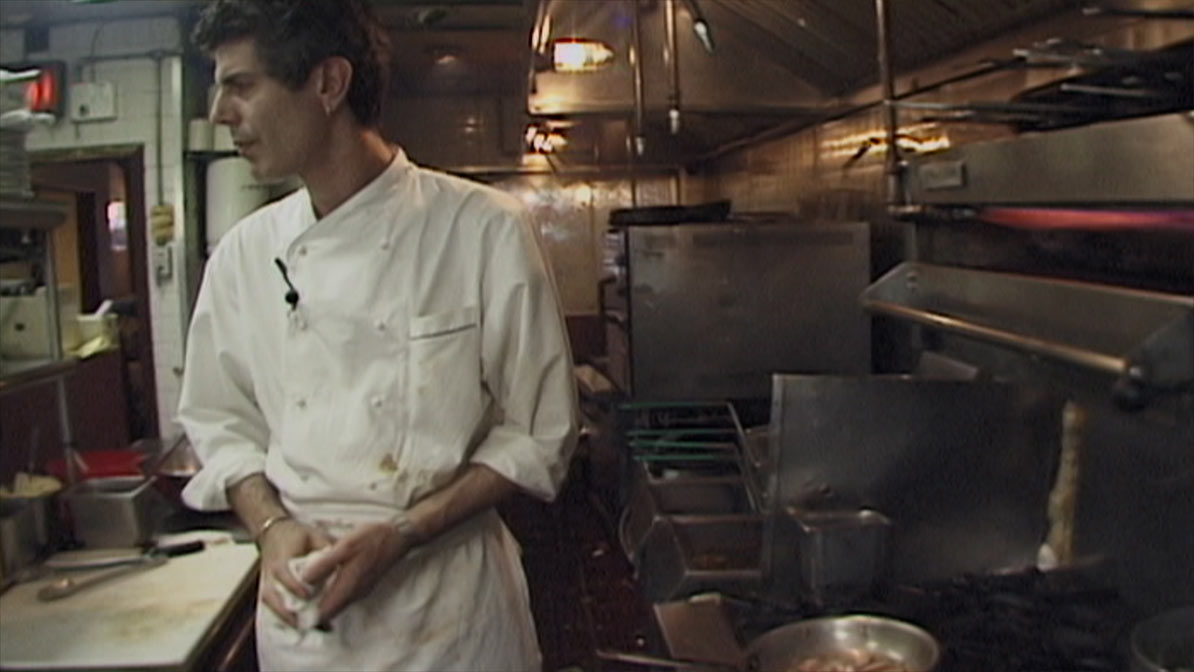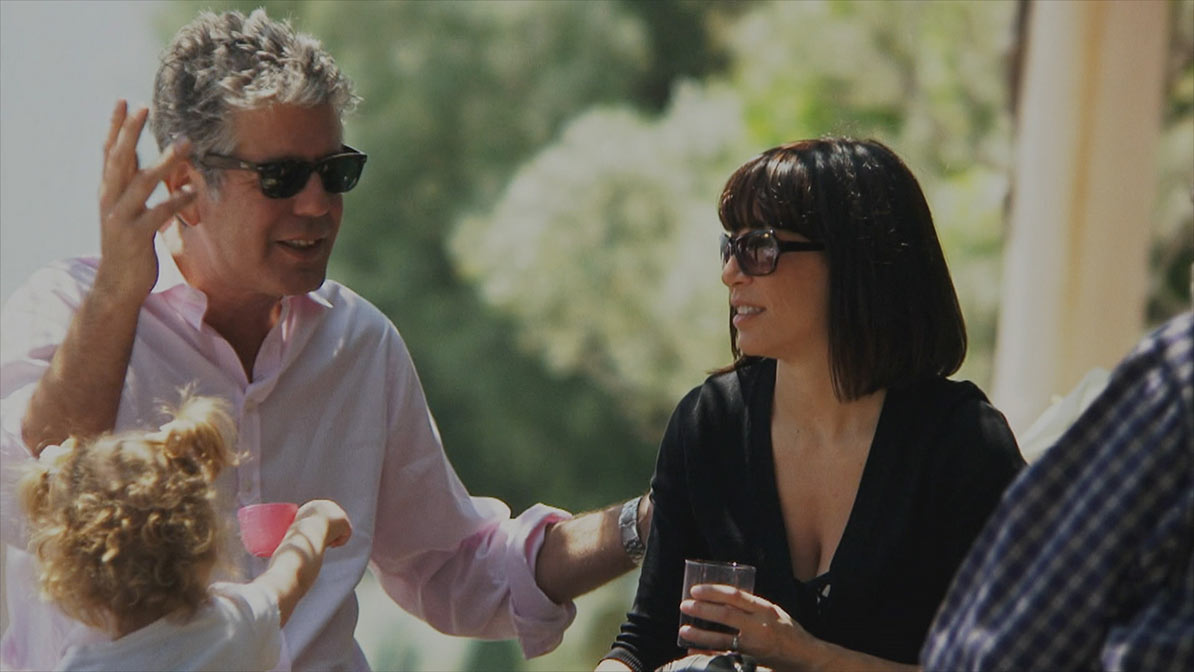When Anthony Bourdain died by suicide in 2018, the news seemed incomprehensible. The face of this gregarious, appealing world traveler had become familiar to almost everybody, even those who had never seen Parts Unknown or any of his other shows. Even better was his voice as a writer, so gloriously showcased in the 2000 memoir Kitchen Confidential: the book, detailing the stress and drug use pervasive in high-end-restaurant kitchens—and offering some later-retracted advice to restaurant goers cautioning them against ordering fish on a Monday—was like something shot out of a cannon. Bourdain seemed like the sort of everyday genius you could actually be friends with—though as Morgan Neville’s Roadrunner: A Film About Anthony Bourdain suggests, that angle was part of the illusion of Bourdain as a public figure, and perhaps less true of the actual man.
Roadrunner is lively, comprehensive, moving and troubling, as well as suitably joyous, capturing everything about why viewers loved Bourdain, while also reminding us that even those very close to him couldn’t always fully understand him. We see a younger, even more wiry Bourdain singing the praises of breakfast-time cigarettes, or play-fencing with a friend, using treacherous-looking kitchen knives as weapons. Neville spends a great deal of time interviewing the producers who first brought Bourdain to television after his memoir’s smash success: One of them, Lydia Tenaglia, says that even though Bourdain was eager to try something new, he also, at first, felt almost disastrously ill at ease in front of a camera—and what’s more, even though he talked a good game, he had never really traveled.
But once Bourdain hit his stride, there was no stopping him. In Roadrunner we see him falling in love with the food, the people, the vibe of Vietnam, and recoiling in horror from the war that broke out in Beirut in 2006, as one of his shows was filming there. That was the point at which he realized he could no longer be just a happy outsider sampling the best food: he became more attuned to what people’s lives were like in the places he visited, and his shows became richer for it.

Watching Roadrunner illuminates every reason viewers found it easy to fall in love with Bourdain: His easy, loping walk, his rubbery grin, how quick he was with a clever, off-handed yet also deeply observant quip. But Neville also shows us that Bourdain’s tendency toward introspection sometimes led him into dark emotional tunnels. The movie opens with Bourdain making dark-as-night jokes about death, and what he thinks might happen to his body after he dies. He also warns, “There’s no happy ending.”
You might wonder—or at least I did—how Neville got these ominous observations from Bourdain, considering that he didn’t start making the film until after Bourdain’s death. As it turns out, there was plenty of audio and lots of footage—from Bourdain’s various television shows, from private sources, from another filmmaker’s never-made documentary—for Neville to use in piecing together this mosaic portrait. These are simply the tools of the documentarian’s art. But in a recent New Yorker interview with Neville, writer Helen Rosner asked him about one particular piece of audio, a segment in which one of Bourdain’s closest friends, the artist David Choe, begins reading an emotionally anguished email Bourdain had sent him. Midway, Choe’s voice dissolves and Bourdain’s kicks in. Rosner asked Neville how he’d obtained a track of Bourdain reading his own email message, and Neville explained that he’d used hours of archival audio to piece together an A.I. version of Bourdain’s voice. “We can have a documentary-ethics panel about it later.”
Read more reviews by Stephanie Zacharek
Maybe sooner rather than later. Neville is a nimble and lively filmmaker who has been making documentaries for years, though he’s earned the most acclaim from two of his most recent films, the delightful 2018 Fred Rogers portrait Won’t You Be My Neighbor?, and 2013’s celebration of great backup singers, 20 Feet from Stardom, which won the Oscar for Best Documentary Feature. And he told Rosner that he had clearance from the Bourdain estate to re-create his subject’s voice. (Bourdain’s widow, the executor of his estate, has denied giving permission.) But even so, Neville’s admission of the deepfake tarnishes Roadrunner. Documentary filmmakers aren’t journalists, strictly speaking. Perhaps they’re more like storytellers on a truth-telling mission, and taking a few small liberties when assembling material is no great sin.

But we also have to, or want to, be able to trust them, and even though I loved Roadrunner when I first saw it, a few weeks ago, I now have too many reservations to fully embrace it. Neville shows, in fairly thorough detail, how dazzled Bourdain was by his last girlfriend, the actor and filmmaker Asia Argento, whom he met after his second marriage—to Ottavia Bourdain, also the mother of his child—had broken up. Neville suggests, not unwisely, that Bourdain seemed to be looking to Argento to complete him in some way; understandably, Argento felt stifled. Their breakup may have precipitated Bourdain’s suicide, though Neville makes it clear that Bourdain was too complicated—and suicide is too complicated—to point to any definitive cause.
Still, why didn’t Neville talk to Argento? According to Rosner, he didn’t even try. Roadrunner may make you feel you know Anthony Bourdain the man, as opposed to Anthony Bourdain the celebrity, much better than you did before. A lot of that knowledge is imparted by those who were closest to him: In the movie’s final minutes, Ottavia’s admission that she felt she failed to protect her ex-husband is so piercingly sorrowful I felt the urge to turn away from the screen. This appears to be an essentially truthful documentary, whatever “truthful” means to us. But it also includes, solely for the sake of filmmaking cleverness, a seed of deceit. And I do wonder what Bourdain, a showman for sure, but also a man who strove to look closely at things others might gloss over, would have made of that.
If you or someone you know may be contemplating suicide, call the National Suicide Prevention Lifeline at 800-273-8255 or text HOME to 741741 to reach the Crisis Text Line. In emergencies, call 911 or seek care from a local hospital or mental-health provider.
More Must-Reads from TIME
- How Donald Trump Won
- The Best Inventions of 2024
- Why Sleep Is the Key to Living Longer
- Robert Zemeckis Just Wants to Move You
- How to Break 8 Toxic Communication Habits
- Nicola Coughlan Bet on Herself—And Won
- Why Vinegar Is So Good for You
- Meet TIME's Newest Class of Next Generation Leaders
Contact us at letters@time.com